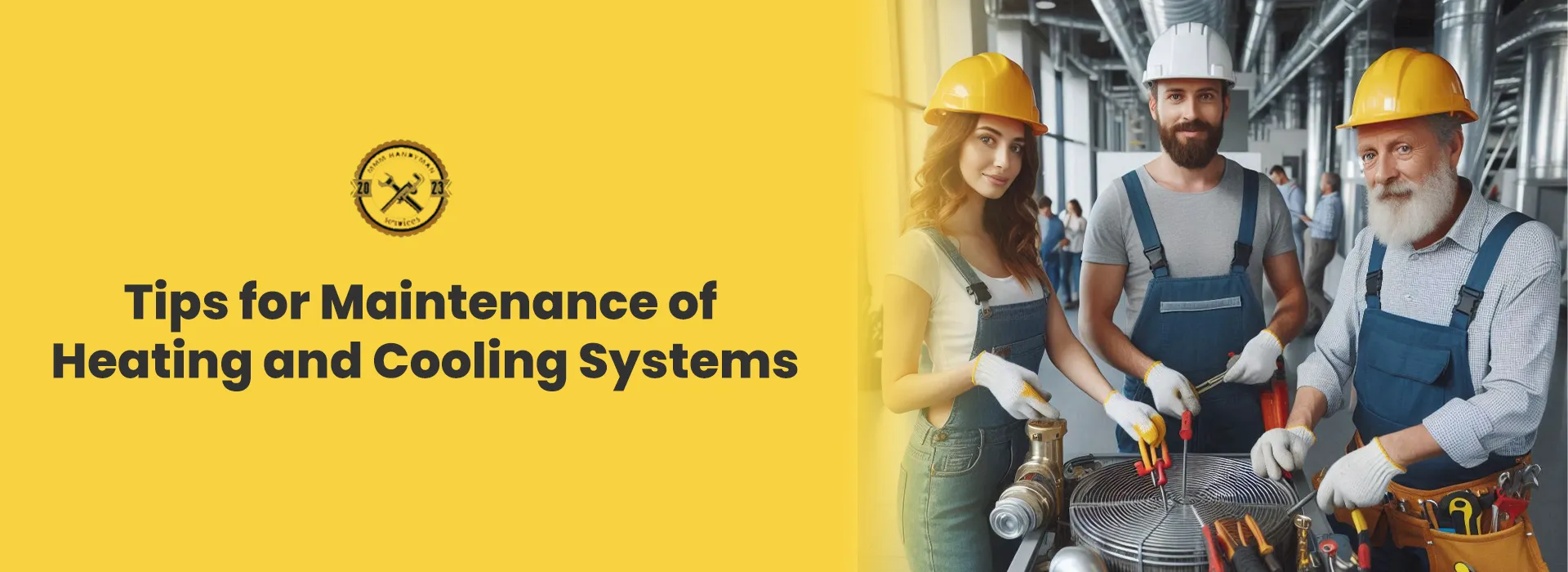
Heating and cooling systems play a crucial role in maintaining comfort throughout the year. Regular maintenance is essential to ensure they work efficiently, last longer, and don’t hike up your energy bills. Here are some essential tips for keeping your heating , ventilation, and air conditioning (HVAC) systems in top shape, presented in a straightforward way that’s easy to follow.
Check and Replace Filters Regularly
Why It Matters: Air filters prevent dust, allergens, and other particles from circulating in your home. Over time, these filters get clogged, reducing airflow and forcing your system to work harder.
How Often: For most HVAC systems, replacing the air filter every 1-3 months is ideal. During high-use periods, such as summer and winter, it’s good to check monthly.
How To Do It: Locate your system’s filter compartment, remove the filter, and hold it up to the light. If you can’t see light passing through, it’s time for a replacement. Filters are often labeled with size and type, so you can grab the right replacement at a home improvement store. Using the right filter is key; check your system’s manual for the recommended type to avoid reducing airflow.
Pro Tip: If you have pets or allergies, consider high-efficiency particulate air (HEPA) filters to capture more allergens and dust.
Keep the Outdoor Unit Clear of Debris
Why It Matters: Outdoor units, especially those for central AC, need space to breathe. Leaves, grass clippings, and debris can restrict airflow, making it harder for the unit to release heat, which can affect its efficiency and lifespan.
How Often: Inspect and clean the outdoor unit every few weeks, especially during fall and spring when debris is more likely to accumulate.
How To Do It: Turn off the unit’s power, then use a garden hose (on a low setting) to wash away dirt and debris gently. You can also trim back any plants or shrubs within two feet of the unit. Avoid using a power washer, as the high-pressure water can damage the unit’s delicate fins.
Pro Tip: If you live in an area with a lot of leaves or other debris, consider placing a mesh cover over the unit when it’s not in use, such as during winter, to keep it clean without restricting airflow.
Inspect the Thermostat
Why It Matters: The thermostat is the brain of your heating and cooling system. If it’s not calibrated or functioning correctly, it can cause your system to run unnecessarily, wasting energy and money.
How Often: Check your thermostat settings every season, or whenever you notice an issue with the temperature in your home.
How To Do It: Start by setting the thermostat to a few degrees above or below the current room temperature, depending on the season, to ensure it responds appropriately. If it doesn’t, check for issues like low battery power or dust buildup. Consider upgrading to a programmable or smart thermostat if you’re still using a manual one. These thermostats can learn your habits, adjust temperatures automatically, and save you money by reducing unnecessary heating or cooling.
Pro Tip: Setting your thermostat to lower (for heating) or higher (for cooling) temperatures when you’re away can help reduce energy usage.
Check for Leaks in Ductwork
Why It Matters: Leaky ducts can lead to significant energy loss, making your HVAC system work harder and increasing your energy bills.
How Often: Inspect your ductwork annually or whenever you notice an unusual spike in your energy bill or uneven temperatures in your home.
How To Do It: Look for visible cracks, gaps, or disconnected sections in your ducts. You can also turn on your system and feel around the ducts for any air escaping. Use duct sealant or metal-backed tape to fix small leaks, but for significant repairs, consider calling a professional.
Pro Tip: Ducts in unconditioned spaces, like attics or basements, should be insulated to minimize energy loss.
Clean and Unblock Vents
Why It Matters: Vents distribute the conditioned air throughout your home, and any blockages can reduce efficiency, create hotspots, and stress the system.
How Often: Check vents seasonally and whenever you rearrange furniture.
How To Do It: First, ensure no furniture or heavy objects are blocking the airflow. Then, use a vacuum with a brush attachment to remove any dust or dirt. If you notice persistent dust or debris around the vent area, consider having your ductwork professionally cleaned.
Pro Tip: In rooms you rarely use, partially close the vents to redirect air to areas where it’s needed more, though be cautious not to completely close any vent as it can strain the system.
Schedule Professional Maintenance Annually
Why It Matters: A licensed HVAC technician can identify and fix issues you might miss, and routine tune-ups can extend your system’s life.
How Often: Twice a year—once before summer for cooling and once before winter for heating.
What To Expect: During an inspection, a technician will check electrical connections, lubricate moving parts, inspect the motor, and ensure the system runs safely and efficiently. This preventative maintenance can save you from unexpected breakdowns and costly repairs.
Pro Tip: Look for companies offering maintenance plans, which may provide discounts and priority service during peak seasons.
Monitor Energy Bills for Unusual Spikes
Why It Matters: Unexpected increases in your energy bill can indicate inefficiencies or issues with your HVAC system, such as leaks, blockages, or component failures.
How To Do It: Compare your current bills to those from the same season last year. If there’s a noticeable difference and your usage patterns haven’t changed, it may be time to inspect the system for issues.
Pro Tip: Keep an energy log to track patterns in your energy use. Many utility companies also offer online tools or apps to monitor your usage in real time.
Consider an HVAC Upgrade When Necessary
Why It Matters: Older systems can be energy hogs, leading to frequent breakdowns and high bills. Upgrading to a more efficient model can save money in the long run.
When To Consider It: If your system is over 10-15 years old, requires frequent repairs, or is becoming costly to operate, it’s worth considering an upgrade.
How To Do It: Research high-efficiency systems, such as those with ENERGY STAR ratings. Many modern HVAC units also come with advanced features like zoned heating and cooling and variable-speed fans for better control and comfort.
Pro Tip: Some utility companies offer rebates for upgrading to energy-efficient models, so check for any available incentives in your area.
Regular maintenance not only extends the life of your HVAC system but also keeps your home comfortable and your energy bills in check. By following these tips, you can enjoy efficient heating and cooling while avoiding unexpected breakdowns and costly repairs.

